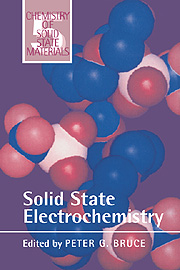Book contents
- Frontmatter
- Contents
- Preface
- 1 Introduction
- 2 Crystalline solid electrolytes I: General considerations and the major materials
- 3 Crystalline solid electrolytes II: Material design
- 4 Ionic transport in glassy electrolytes
- 5 Polymer electrolytes I: General principles
- 6 Polymer electrolytes II: Physical principles
- 7 Insertion electrodes I: Atomic and electronic structure of the hosts and their insertion compounds
- 8 Electrode performance
- 9 Polymer electrodes
- 10 Interfacial electrochemistry
- 11 Applications
- Index
Preface
Published online by Cambridge University Press: 14 September 2009
- Frontmatter
- Contents
- Preface
- 1 Introduction
- 2 Crystalline solid electrolytes I: General considerations and the major materials
- 3 Crystalline solid electrolytes II: Material design
- 4 Ionic transport in glassy electrolytes
- 5 Polymer electrolytes I: General principles
- 6 Polymer electrolytes II: Physical principles
- 7 Insertion electrodes I: Atomic and electronic structure of the hosts and their insertion compounds
- 8 Electrode performance
- 9 Polymer electrodes
- 10 Interfacial electrochemistry
- 11 Applications
- Index
Summary
Significant advances in our understanding of solid state electrochemistry have taken place over the last 30 years. The subject has grown rapidly and is, as illustrated in Chapter 1, much closer to the more established electrochemistry in liquid electrolytes than at any time since Faraday's pioneering work in both fields some 150 years ago. Although several books have appeared dealing with ionically conducting materials from a structural point of view, very few texts are available which describe the physical electrochemistry of solids. The present textbook aims to present the fundamentals of solid state electrochemistry with a strong emphasis on the physical aspects. It is directed primarily towards postgraduate students and other scientists and engineers entering the field for the first time, as well as those active in the areas of batteries, fuel cells, sensors and electrochromic devices, topics for which solid state electrochemistry makes a major contribution. Although the reader requires little prior knowledge of solid state electrochemistry, the subject is treated at a relatively advanced level and therefore significant sections of the book should be of interest to all electrochemists, as well as those already active in the electrochemistry of solids. The structural and material aspects of the subject are not ignored, indeed some knowledge of the most important solid electrolytes and intercalation electrodes is an essential foundation on which to build an understanding of the physical properties.
- Type
- Chapter
- Information
- Solid State Electrochemistry , pp. xv - xviPublisher: Cambridge University PressPrint publication year: 1994

